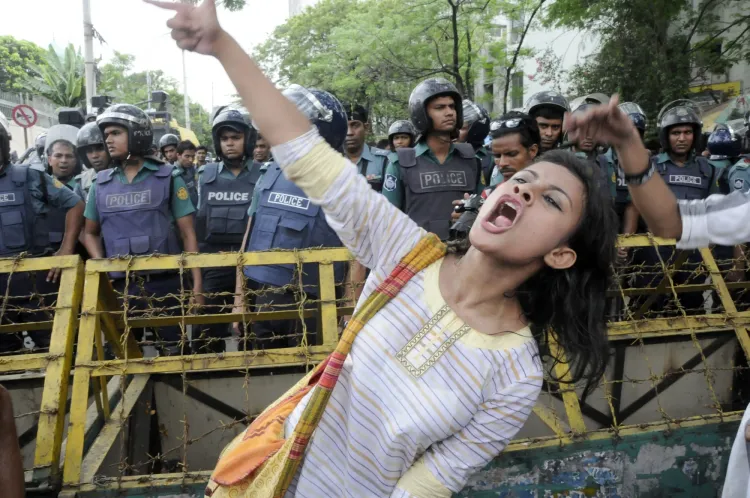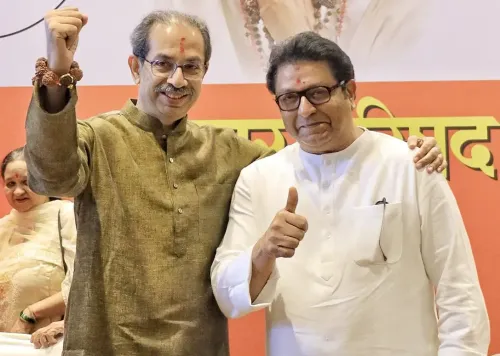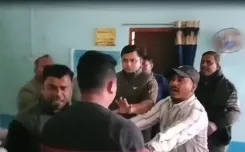Birangana: Pakistan's Army Crimes Against Women Still Unacknowledged

Synopsis
Key Takeaways
- Operation Searchlight initiated a campaign of terror in 1971.
- Systematic sexual violence was utilized against Bengali women.
- Biranganas represent both victims and active resistance fighters.
- Pakistan has not acknowledged its army's crimes.
- The ongoing impact of these atrocities requires remembrance and justice.
New Delhi: In December 1970, Pakistan conducted its inaugural democratic National Assembly elections, with the Awami League, a political faction rooted in East Pakistan, achieving a significant victory. However, rather than honoring the people's choice, the political and military elite of West Pakistan—driven by an entrenched bias against the Bengali populace, whom they perceived as socially and culturally ‘inferior’ — opted to suppress their aspirations through sheer military might.
This response culminated in Operation Searchlight on March 25, 1971 - an incomprehensible campaign of terror aimed at dismantling Awami League supporters and their allies. What started as a calculated crackdown quickly transformed into an indiscriminate genocide against the Bengali people, whose only “crime” was their call for equal citizenship rather than being treated as colonial subjects.
The atrocities unleashed by the Pakistan Army ravaged the streets of Dacca (now Dhaka) and extended into the most remote villages, leaving untold devastation. Among the most harrowing violations was the systematic sexual violence inflicted upon Bengali women, a tragedy that has been appallingly neglected in historical narratives.
These biranganas — “war heroines” — carry the profound scars of Bangladesh's quest for independence, their suffering a stark testament to the cost of liberation. After 54 years, the wounds from 1971 remain unhealed, compounded by Pakistan’s stubborn refusal to recognize its army's genocidal actions, much less issue an apology. This disgraceful denial remains an enduring blemish on history, a poignant reminder of justice long denied.
The horrors of war extend well beyond the battlefield; they seep insidiously into the very fabric of society, leaving scars that transcend military conflict. One of the most egregious manifestations of this brutality is sexual violence, wielded with calculated cruelty to devastate both individuals and communities. During the cataclysmic events of the 1971 Liberation War, the Pakistani military orchestrated a campaign of systematic rape and torture, using it as a tool of both physical domination and psychological destruction. Women's bodies, historically regarded as the bearers of familial and societal honor, became the battleground upon which this savagery was unleashed.
As Operation Searchlight cast its dark shadow over Dhaka, countless Bengali women were forcibly taken from their homes and university campuses, their futures tragically altered as they were transported to military barracks and confined to what can only be described as “rape camps”. Subjected to relentless abuse, many perished at the hands of their aggressors, their suffering rendered invisible amidst the tide of genocide. A sinister agenda fueled this depravity—the calculated aim of impregnating Bengali women to dilute ethnic identity, a nefarious attempt at demographic manipulation.
The so-called “war babies”, estimated at around 20,000, were intended as a grotesque means of tethering East Pakistan's future to the bloodlines of the West. This brutal strategy, steeped in violence and a grotesque abuse of power, epitomized the depths to which oppression can sink in its ruthless quest for domination.
The horrors of war permeated the very essence of human dignity as the Pakistan Army weaponized rape to inflict psychological trauma upon the Bengali populace. In a calculated effort to shatter the spirit of resistance and compel submission, women were subjected to unimaginable brutality, often in the presence of their own families.
With the complicity of collaborators — the infamous razakars — who abducted and delivered women, particularly from the Hindu community, the army orchestrated sexual violence on an unfathomable scale. The aftermath was as gruesome as the crime itself: bodies of slain victims hung from trees, discarded in mass graves, or strewn beneath bridges—chilling symbols of the price of nationalist aspiration. In this grotesque theater of terror, rape was not merely a weapon of war; it was a calculated strategy to annihilate a people's will.
The systemic and brutal use of sexual violence as a weapon of war during Bangladesh's Liberation War remains one of the darkest stains on human conscience. The atrocities committed against an estimated 200,000-400,000 women were not incidental but deliberate—a vile strategy of warfare designed to terrorize and subjugate a population.
However, to reduce Bengali women's roles in 1971 merely to that of victims would be a grave error. Women were not just passive sufferers but active participants in the resistance, standing shoulder to shoulder with the Mukti Bahini. They smuggled arms and intelligence, cared for the wounded, and even took up arms themselves—undaunted warriors in their own right. Their contributions were as significant as their male counterparts, their sacrifices equally valiant.
It was Bangabandhu Sheikh Mujibur Rahman who sought to dignify these women by naming them “Birangana” — a title intended to honor their bravery. Yet, in the post-war years, the term tragically became synonymous with shame, as society reduced these war heroines to mere victims of rape, as if their suffering was theirs alone to endure. Instead of receiving gratitude from a liberated nation, they were met with ostracism, rejection, and silence.
Many families refused to welcome them back, further condemning them to a life of isolation. The establishment of the War Crimes Tribunal in 2010 was a long-overdue step toward justice, yet the scars of betrayal remain.
Pakistan has yet to recognize its army's heinous crimes, and Bangladesh's collective memory has yet to fully embrace these women as the warriors they truly were. On the 54th anniversary of Operation Searchlight, let us not only remember Pakistan's war on women but also honor the Birangana for their unwavering strength in forging a free Bangladesh.










